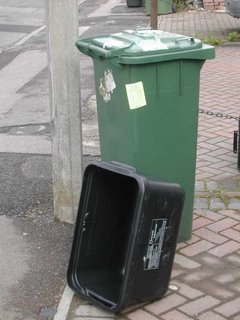
Reduce, Reuse and Recycle - This is the underlying message of sustainable living.
Reduce your consumption of energy, water, materials, packaging etc, in an attempt to produce less waste.
Reuse items as much as possible rather than throwing them straight into the rubbish bin.
Recycle packaging materials, bottles, cans, newspaper card etc.
In our humble 2 person household we try to do this as much as possible. All vegetable and kitchen scraps, teabags etc are put into a small bin and then go into the compost heap.
Bottles and cans are taken to the local bottle bank, and paper and card etc is put out into the council provided recycling box once a week.
As a consequence of this, we only create about one half of a black bin-liner of household waste per week, and the majority of this is plastic food packaging, which is either difficult to recycle, or the council do not provide the means to recycle it.
The irony of this situation is that there is a high percentage of non-biodegradable, oil-rich plastics in every bag of rubbish - including the bag itself, and this is the very stuff that is being dumped into landfill.
If we go back 50 years to before the age of plastic packaging, foodstuffs would be sold in paper and card wrappings, with meat and cheese etc sold in greaseproof wraps. Groceries would be sold in brown paper bags and larger items in cardboard boxes. Almost 100% of the packaging materials could be re-cycled, were bio-degradable but because of the high percentage of open coal fires in the UK, most waste was burnt on the fire, so that the only waste product was ashes from the grate.
Whilst I am in no way recommending a return to the DIY incineration of packaging materials - especially because of the high plastic content, perhaps the supermarkets should re-examine their packaging policies, and offer foodstuffs in bio-degradable natural packaging materials. If they are not prepared to do this, then perhaps we should vote with our feet.
It is said that approximately one third of the cost of our supermarket foods consists of the non-edible packaging materials.
Part of the problem with re-cycling is that it only works if there is a market for the material that you are recycling.
One notorious example was when the directors of a council-contracted waste disposal firm working in Kent and Essex, decided that the most cost effective way of recycling some of the South East's mountain of waste was to ship it, several container loads at a time, to bogus addresses in the Far East - adopting an out of sight, out of mind strategy.
I do rather hope that criminal proceedings are brought upon the directors of that organisation, but I fear that because our local councils are sub-contracting out waste disposal to the cheapest operators, this practice is common place.
As oil prices rise, then the cost of plastic packaging is also going to rise. If oil becomes scarce in the next 50 years, then alternatives will need to be found for packaging materials, and it may become viable to recycle and reuse waste plastic. We may even end up excavating 50 year old landfill sites, in an attempt to extract the plastic-rich material. The irony of this, is that many of these landfill sites will have some of John Prescott's 100,000 new home built on them - but judging by the poor standards of this latest wave of house building, very few are likely to be standing in 2050!
So what can we do now to reduce packaging waste going to landfill?
Avoid buying foodstuffs in plastic wrappers?
Buy food in bulk from a cash & carry, so the percentage of food to wrapping is much higher.
Buy foods from traditional shops - greengrocers, butchers and bakers. These shops are more likely to be sympathetic to your viewpoints on plastic packaging.
Have vegetables delivered in a cardboard veg-box, to avoid half a dozen plastic bags.
Reuse your plastic carrier bags several times for carrying shopping home.
With sufficient numbers of people taking a pro-active stand on plastic packaging, the supermarkets could be forced to rethink their strategies.
However I suspect that however well intended our recycling efforts are, we will never stop the tide of household items that end up in landfill - TVs, computers, printers, ink jet cartridges, VCRs, child car-seats, the mountain of modern day waste is growing daily.
No comments:
Post a Comment